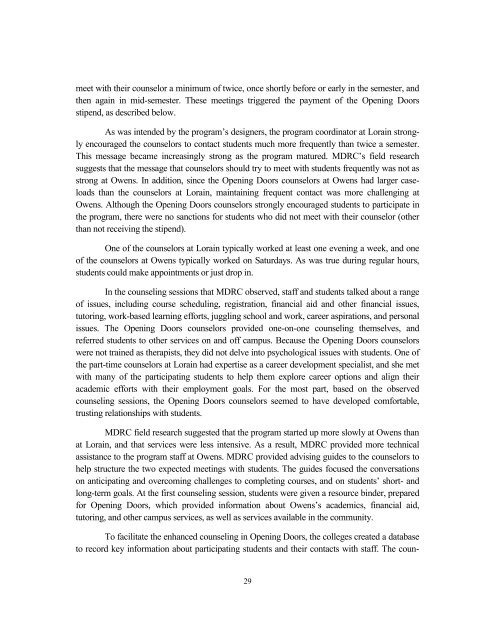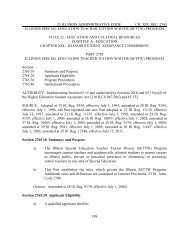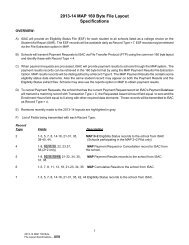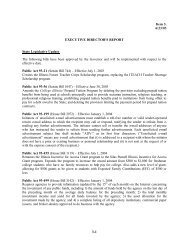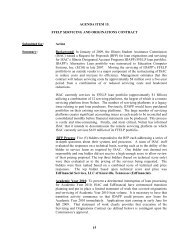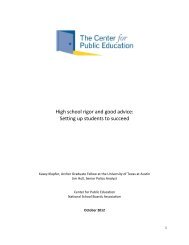Both programs experienced some staff turnover throughout the study, but turnover wasa more substantial issue at Owens. At Lorain, one of the part-time counselors left the college in2004, but she was replaced relatively quickly. At Owens, the program coordinator left theposition just before the first semester of implementation. A few months later, the senior administratorwho oversaw the program went on leave, owing to health problems. Over the program’stwo-year operations, two of the part-time counselors left their positions. Owens respondedquickly, filling most of the positions within weeks. When a counselor left the program duringthe summer of 2005, however, the college decided not to replace her. As a result, for the fall2005 and spring 2006 semesters, Owens’s Opening Doors program had two part-time counselors,rather than three. This affected caseload sizes, as discussed below.Enhanced Counseling and AdvisingThe linchpin of the Opening Doors program in Ohio was a team of counselors withwhom students were expected to meet regularly for two full semesters to discuss academicprogress and any issues that might affect their schooling. Each student was assigned to acounselor, who acted as the student’s primary contact, but students could, and sometimes did,see other counselors on the team. MDRC field research found that the Lorain program reliedsomewhat more heavily on the team approach than did the Owens program.The Opening Doors counselors each worked with far fewer students than other counselorsat the colleges. Lorain’s Opening Doors program had the equivalent of one full-timecounselor for every 81 students participating in the program in a given semester, on average. AtOwens, the corresponding number was 157. At Owens, caseload sizes peaked when the programhad only two part-time counselors, rather than three. During the fall 2005 semester,Owens had one full-time Opening Doors counselor for every 256 program group students.For the control group, the ratio of students to counselors or advisers at the colleges wasmore than 1,000 to 1. Although the Opening Doors counselors worked with far fewer studentsthan typical counselors or advisers, they reported to MDRC that sometimes it was difficult tokeep on top of their work and they felt frustrated that they were not doing everything theycould for their students. This was especially true during the period when caseload sizes werelargest at Owens.The counseling in Opening Doors was designed to be more intensive, personalized, andcomprehensive than what students would typically receive at Lorain or Owens. The markedlylower student-to-staff ratio in the program allowed counselors to see students more frequentlyand spend more time with them. This increased contact, the program’s designers posited, wouldallow the counselors to uncover and address more issues relevant to the students’ success inschool. During each of the two program semesters (fall and spring), students were expected to28
meet with their counselor a minimum of twice, once shortly before or early in the semester, andthen again in mid-semester. These meetings triggered the payment of the Opening Doorsstipend, as described below.As was intended by the program’s designers, the program coordinator at Lorain stronglyencouraged the counselors to contact students much more frequently than twice a semester.This message became increasingly strong as the program matured. MDRC’s field researchsuggests that the message that counselors should try to meet with students frequently was not asstrong at Owens. In addition, since the Opening Doors counselors at Owens had larger caseloadsthan the counselors at Lorain, maintaining frequent contact was more challenging atOwens. Although the Opening Doors counselors strongly encouraged students to participate inthe program, there were no sanctions for students who did not meet with their counselor (otherthan not receiving the stipend).One of the counselors at Lorain typically worked at least one evening a week, and oneof the counselors at Owens typically worked on Saturdays. As was true during regular hours,students could make appointments or just drop in.In the counseling sessions that MDRC observed, staff and students talked about a rangeof issues, including course scheduling, registration, financial aid and other financial issues,tutoring, work-based learning efforts, juggling school and work, career aspirations, and personalissues. The Opening Doors counselors provided one-on-one counseling themselves, andreferred students to other services on and off campus. Because the Opening Doors counselorswere not trained as therapists, they did not delve into psychological issues with students. One ofthe part-time counselors at Lorain had expertise as a career development specialist, and she metwith many of the participating students to help them explore career options and align theiracademic efforts with their employment goals. For the most part, based on the observedcounseling sessions, the Opening Doors counselors seemed to have developed comfortable,trusting relationships with students.MDRC field research suggested that the program started up more slowly at Owens thanat Lorain, and that services were less intensive. As a result, MDRC provided more technicalassistance to the program staff at Owens. MDRC provided advising guides to the counselors tohelp structure the two expected meetings with students. The guides focused the conversationson anticipating and overcoming challenges to completing courses, and on students’ short- andlong-term goals. At the first counseling session, students were given a resource binder, preparedfor Opening Doors, which provided information about Owens’s academics, financial aid,tutoring, and other campus services, as well as services available in the community.To facilitate the enhanced counseling in Opening Doors, the colleges created a databaseto record key information about participating students and their contacts with staff. The coun-29
- Page 1: OPENING DOORSMORE GUIDANCE,BETTER R
- Page 4 and 5: Funders of the Opening Doors Projec
- Page 7 and 8: ContentsOverviewList of Tables, Fig
- Page 9 and 10: List of Tables, Figures, and BoxesT
- Page 11: PrefaceIf approved by Congress, the
- Page 14 and 15: guidance on the study. Thomas Brock
- Page 16 and 17: • The Ohio colleges successfully
- Page 18 and 19: Program group members were assigned
- Page 20 and 21: • For the most part, the program
- Page 22 and 23: offered, but might also provide stu
- Page 25 and 26: Chapter 1IntroductionOver the last
- Page 27 and 28: The Opening Doors DemonstrationTabl
- Page 29 and 30: sure that students complete the req
- Page 31 and 32: While the mechanism through which s
- Page 33 and 34: imately 1,700 to 1 in 2001. 22 Exac
- Page 35: of literature exist on career couns
- Page 38 and 39: The CollegeLorain County Community
- Page 40 and 41: • Were beginning freshmen or cont
- Page 42 and 43: The Opening Doors DemonstrationTabl
- Page 44 and 45: Table 2.1 (continued)SOURCE: MDRC c
- Page 46 and 47: Lorain and Owens Financial Aid Data
- Page 49 and 50: Chapter 3The Implementation of the
- Page 51: Toward the end of each student’s
- Page 55: The Opening Doors DemonstrationTabl
- Page 59 and 60: Appendix Table C.2 shows informatio
- Page 61: Opening Doors counselors, and progr
- Page 64 and 65: Program Control Difference Standard
- Page 67 and 68: Chapter 4The Effects of Enhanced St
- Page 69 and 70: Program SemestersTable 4.1 (page 47
- Page 71 and 72: Program Control Difference Standard
- Page 73 and 74: Program Control Difference Standard
- Page 75 and 76: The Opening Doors DemonstrationTabl
- Page 77 and 78: Transcript Outcomes by GenderAssess
- Page 79 and 80: Program Control Difference Standard
- Page 81 and 82: Program Control Difference Standard
- Page 83 and 84: correspond with the program’s imp
- Page 85 and 86: Chapter 5Summary and ConclusionsLor
- Page 87 and 88: The Opening Doors DemonstrationFigu
- Page 89 and 90: An alternative interpretation of th
- Page 91: Appendix ASupplementary Baseline In
- Page 94 and 95: Full Program ControlCharacteristic
- Page 96 and 97: Appendix Table A.1 (continued)Full
- Page 98 and 99: Full Program ControlCharacteristic
- Page 100 and 101: Appendix Table A.2 (continued)Full
- Page 102 and 103:
Appendix Table A.3 (continued)Full
- Page 105:
Appendix BSurvey Response Analysis
- Page 108 and 109:
Background Characteristics of Surve
- Page 110 and 111:
Table B.1 (continued)Characteristic
- Page 112 and 113:
The Opening Doors DemonstrationAppe
- Page 114 and 115:
Table B.2 (continued)SOURCE: MDRC c
- Page 116 and 117:
Table B.3 (continued)Characteristic
- Page 118 and 119:
The Opening Doors DemonstrationAppe
- Page 120 and 121:
Table B.4 (continued)SOURCE: MDRC c
- Page 122 and 123:
Table B.5 (continued)Characteristic
- Page 124 and 125:
The Opening Doors DemonstrationAppe
- Page 126 and 127:
Table B.6 (continued)SOURCE: MDRC c
- Page 129 and 130:
Lorain OwensProgram ProgramOutcome
- Page 131 and 132:
Lorain County Community CollegeOwen
- Page 133:
Appendix DDescription of Scales Pre
- Page 136 and 137:
4. I hardly ever expect things to g
- Page 138 and 139:
Social Support and Civic Engagement
- Page 140 and 141:
Psychological Distress (6-item summ
- Page 143 and 144:
Lorain County Community CollegeOwen
- Page 145 and 146:
Lorain County Community CollegeOwen
- Page 147 and 148:
Lorain County Community CollegeOwen
- Page 149 and 150:
Male SubgroupFemale SubgroupDiffere
- Page 151 and 152:
Male SubgroupFemale SubgroupDiffere
- Page 153 and 154:
Male SubgroupFemale SubgroupDiffere
- Page 155 and 156:
Lorain County Community CollegeOwen
- Page 157 and 158:
Appendix Table E.7 (continued)SOURC
- Page 159 and 160:
Lorain County Community CollegeOwen
- Page 161 and 162:
The Opening Doors DemonstrationAppe
- Page 163 and 164:
Appendix Table E.10 (continued)SOUR
- Page 165 and 166:
ReferencesAdelman, Clifford. 2004.
- Page 167 and 168:
EARLIER MDRC PUBLICATIONS ON OPENIN
- Page 169:
About MDRCMDRC is a nonprofit, nonp


